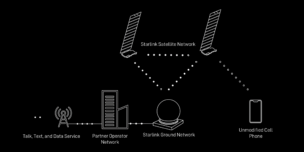Starlink’s bid for more spectrum allowance in the US isn’t going as it hoped. Yesterday, the FCC shot down its request to use regions of spectrum in the 1.6/2.4 GHz bands and 2GHz bands that include bands exclusive to Globalstar ($GSAT) and Dish. Starlink would have used these bands for its mobile connectivity service.
- The FCC’s reasoning was that those bands are unequipped to handle a large LEO constellation’s transmissions.
- The original application for the bands was filed by SpaceX over a year ago.
A new rulemaking would be required to consider granting SpaceX additional spectrum for Starlink in these bands, the FCC wrote in its decision.
About the T-Mobile deal: Nothing’s changed. Starlink’s deal with the telecom provider would operate in the 1.9 GHz band, where T-Mobile holds licensed spectrum. The major impact is holding up expansion and scaling of the service.
Starlink’s spectrum in Iran
While we’re on the topic of Starlink and its spectrum usage, the service may soon be in hot water with the International Telecommunication Union (ITU) for overstepping its boundaries when it comes to providing service in Iran.
The Iranian government submitted a complaint last month to the ITU, which doles out and monitors the usage of spectrum globally, claiming that Starlink is illegally providing broadband service within the nation’s borders.
A brief history: This isn’t the first time Iran has aired grievances against Starlink finding its way past the country’s borders. Iran’s government is notoriously against the free use of internet services, and is having trouble squashing independent efforts to bring connectivity to the populace.
Smugglers have brought connectivity to Iran by activating Starlink terminals in nearby nations where it’s allowed, then bringing those activated terminals over the border, according to Bloomberg reports.
The ITU’s turn: The ITU’s mandate isn’t to facilitate the free flow of information—it’s to keep conflict away from the literal airwaves. The UN-affiliated organization has wagged a finger at the US and Norway—which split management responsibilities re: Starlink—for allowing Starlink connectivity to creep into Iran before, and it’s likely to do it again.




